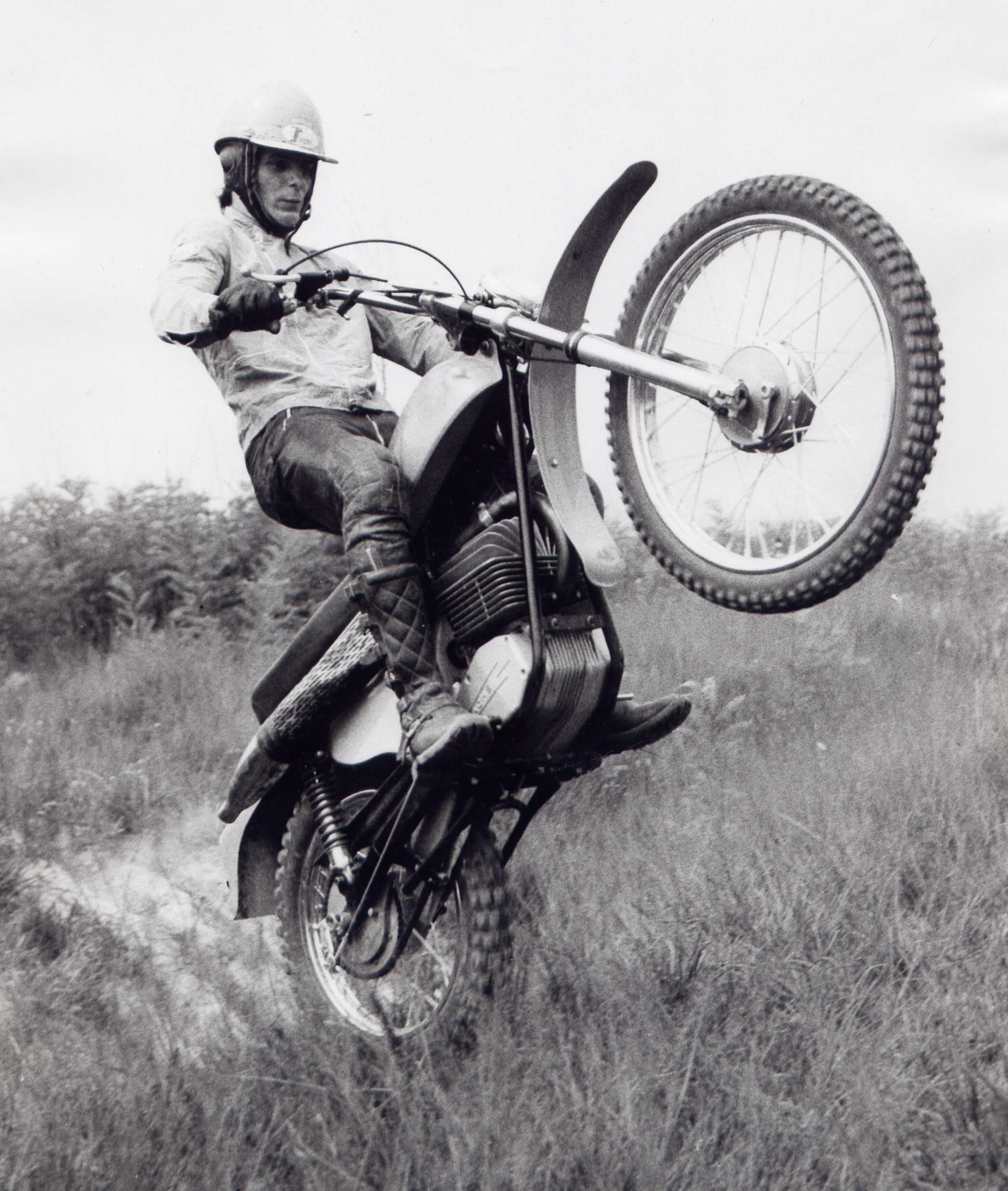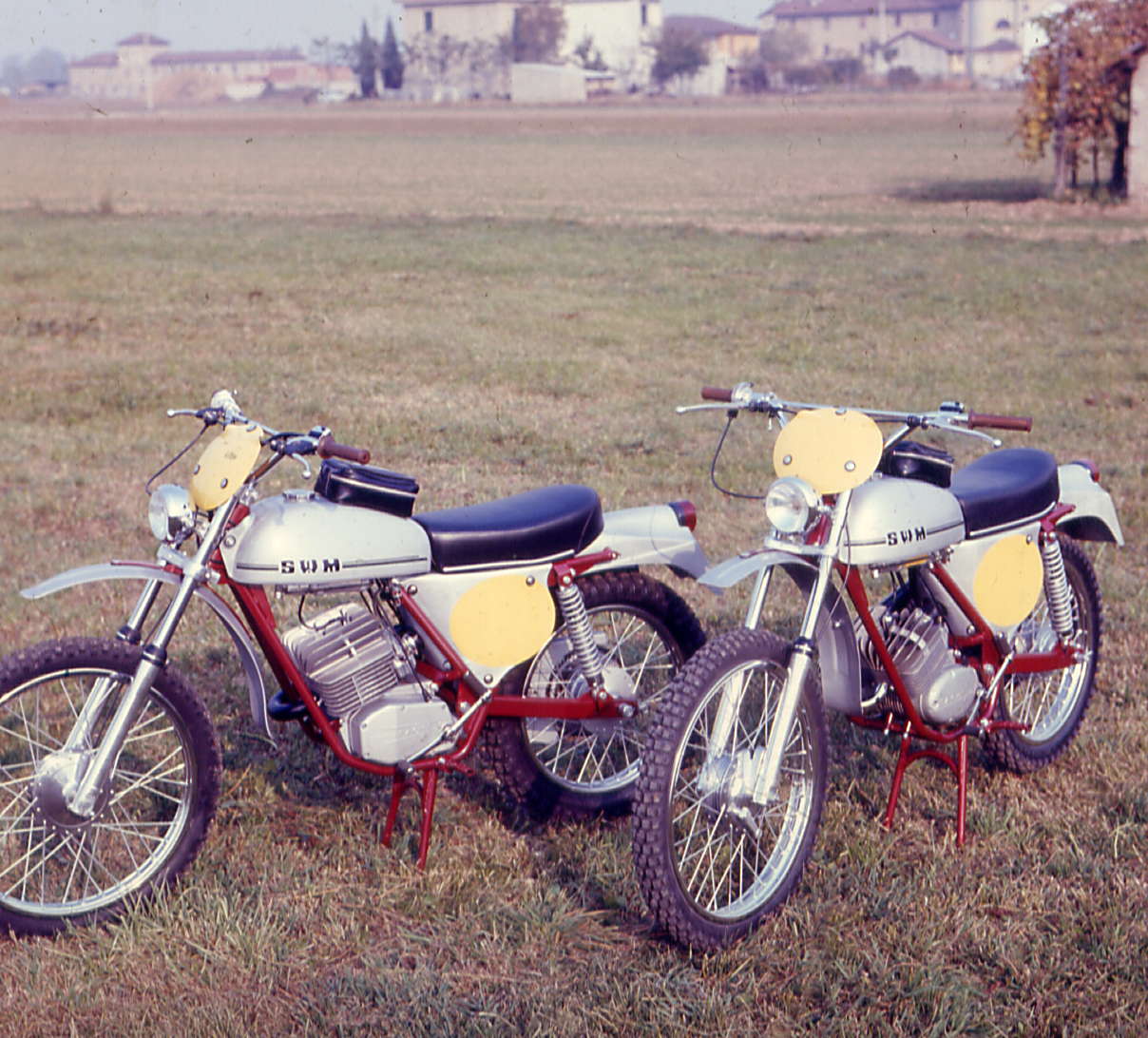SWM HISTORY 1


During a wintry evening, before a sumptuously laid table, two friends, Pietro Sironi and Fausto Vergani, with the passion for the motorcycling, had the idea of assembling a trail bike, which was able to oppose the supremacy of the incomparable bikes beyond the Alps.
P. Sironi started measuring himself in the Audax in 1953 but during the training, for the participation at one Milano- Taranto, had a heavy accident that forced him in the hospital for 60 days with the rehabilitation.
One-year leather he tested himself in the reliability trial in which was a protagonist but in 1968 the work forced him “to hang the crash helmet on the wall” and in this way he started a second phase of motorcycling passion and for this reason he decided to bring an Italian motorcycle at the top of the world reliability trial.
F. Vergani, good rider of FF OO and Gilera’s expert witness motor with the passion for the motors at rotating suction, realized, with other Gilera’s technician, the beautiful 2T rotary’s prototype that comes from a home reliability of 1965.
The initiative was taken by Pietro Sironi who used to meet F. Vergani (in the limits of the availability, for the work’s engagements) in Vimercate in the garage of this one in the evening where they started the projects of the first prototype. They had to invent a rational, vigorous and competitive vehicle; the four stroke engine of that time (GILERA, GUZZI, MORINI E DUCATI ) were old compared to the foreign two stroke engine. Like this was produced the first motorbike which was distinguishable for the solidity and the adoption of an unusual staple in rectangular section (criticized at that moment but now used by everyone). From an aesthetic point of view it was like a Morini, the convertor was borrowed from an Hercules and it passed under the fuel tank and the motor was a Sachs 125 6 B. One of the first ones who tried it was Franco Acerbis, at that time rider of reliability trial and aspirant journalist, well known nowadays for the homonym business (which was built thanks to SWM).
Pietro Sironi and Fausto Vegani decided to name the new motorcycle with the acronym SVVM because it was realized in Vimercate, which is in the province of Milan. The trademark was registered on 11/07/ 1971 with the name SWM - SPEEDY WORKIN MOTORS –, because this acronym was catchier all over the world compared to SVVM; it had the branch in Palazzolo Milanese. The first prototype had a great success so they decide to produce some definitive prototypes of 50cc, 100cc and 125cc named “REGOLARITA’”. Sironi, who already was the owner of a racing stable in the extent of MC IL NAVIGLIO, decided to commit the first bikes to three of his riders; Franco Acerbis, Renato Anesa and Pasquale Bernini, who were assisted by the sporting director Alfredo Manfredini.
In this way came the first successes joined with the first requests of motorcycles after the exposition at the “Salone del Ciclo e Motociclo” of Milan on November 1971 where they checked interest from the public. The commercial collaboration was demanded to the legendary old man of the reliability trial, Ermanno Zampolli. Afterwards they produced the first motorbikes for the first pilots of the early SWM team (Vergani Fausto, Redrezza, Signorelli Giuseppe and Rottigni Pierluigi) in Rivolta d’Adda. At the same time were produced small quantitative of the bikes for the SWM sympathizing; this initiative was totally sportive, without profit, and this was demonstrated by some loyal friends of SWM, like Sergio Cristina from Lozano; they took back some particulars of dissembled motorbikes to reassemble them for their riders.
The international debut happened in the European championship, which was disputed in Segovia (Spain) with some vicissitudes. For a long time the FMI was not interested in the participation in the European championship competition of reliability trial, because they had some financials difficulties for that demonstrations. SWM let FMI know that they wanted to take part in the Segovia’s competition and, for this reason, FMI decided to allow a team manager to be present in the international jury, all at SWM’s expenses; fortunately was chosen doc. Mario Tremaglia. Ten days before the departure was all arranged for the debut, the bicycle part fell within the competence of SWM and the motors, for that occasion, fell within the competence of Sachs, because this German company had been always on time but not in Segovia because Italy had little credibility. After many telephonic contacts with the business managers, they guaranteed the directly forwarding in Spain nearby the airport of Madrid the same day of the arrival of the SWM team. That was a hard decision, to leave or not to leave, to trust or not to trust on the Sachs promises… the sportsmanship prevailed and they leaved for Spain.
Pietro S. and doc. Tremaglia went to the airport on Thursday to draw the motors but they checked another time that the absence of the forwarding (man thinks that neither the Kaiser had cursed against his people like in that occasion). The two went, without loosing the temper, at the SAME’s seat in Madrid where the general manager, a Tremaglia’s friend, paid attention and placed his office at their disposal; after further calls at SAME’s seat to convince them that the SWM staff was really on the competition place, the Sachs’s business managers guaranteed with mathematical certainty that the motors would arrived the fallowing day with a Lufthansa flight. Another time with the SAME’s manager took place the customs clearance of the longed- for motors on Friday at 15.30; after a further trip of 130 km they arrived in Segovia to be installed on the SWM bicycle parts.
All the SWM staff, pilots included, exerted themselves for the preparation of the motorbikes and was used some motors that SWM had previously prepared because they could not use all the motors that Sachs had prepared because of some scanty lack due of their hasty preparation. The works were ended 1.30 am of Saturday. Fortunately, the preliminary operations would be done on Saturday at 7.00 am and after a speedy sleep with waking up at 6.00 am the team presented punctually him at the punching of 7.00 am; the start of the competition was fixed at 8.30 am. With not many means and staff at disposal included the assigned to the international jury, they organized the service at the time controls: Sironi hold two CO, Tremaglia hold the CO at the start and the good Graziano Cervi that at the Sierra Nevada.
The first competition’s day (Saturday) passed without tribulations; the course was demanding the weather was sunny and the temperature was +20°; the unique note of affliction was the retiring of the rider Ciceri but the other SWM riders figured in the top of the results.
The second competition’s day (Sunday) started with a good weather at the start but during the competition, the weather changed constantly so much so that started to rain in Segovia and started snowing in the Sierra Nevada. The poor Cervi arrived at his CO only after many peripeteias and only for the second riders’ passing; because he was all soaked of rain and snow he had to stay at the competition’s service for all the time.
In the middle of the competition the strength started to fall for all the riders, executive included; the stress for the adventure of the lacking motors, the tension and the stressing effort for the preparation of the motorbikes began to make itself felt. All that, added to the inclemency of the weather, forced Vergani to the retiring, jointly at other riders. At the arrival came only few riders including the surviving of the Italian expedition (exclusively SWM) who obtained excellent results (considered that was the fist international’s coming out). They resulted:
Redrezza 5° 50cc
Signorelli 3° 100cc
Rottigni 2° 125cc
The rivals congratulated on the SWM staff for the troubled venture and after the prize giving of the SWM riders by the international’s jury, they granted a personal celebration even if they were tired but satisfied.
The day after the competition (Monday) the motors were dissembled by the motorcycles to be sanded in Germany because they were declared in customs transition in Spain. After this adventure, Sachs had always more consideration of the SWM family, even if they would not be Sachs dependent any more.
The SWM started the preparation on their own of the new motors in useful time and in this way, they obtained the well-known and deserved national and international laurels.


